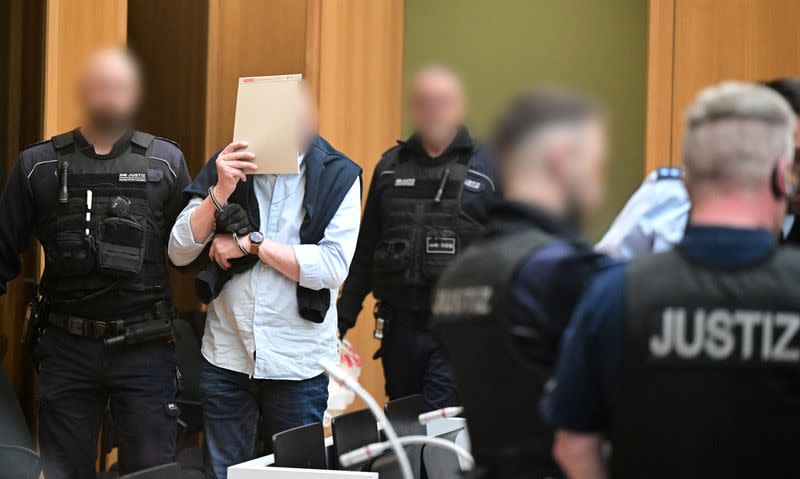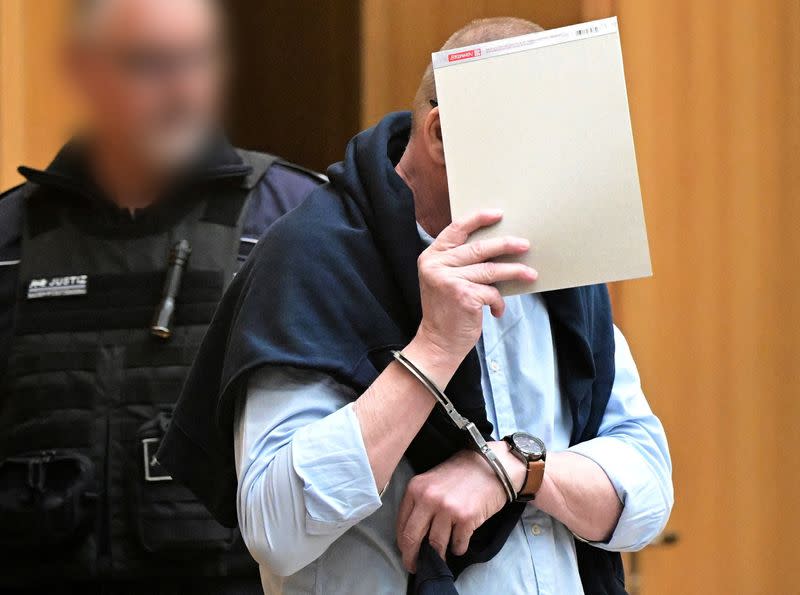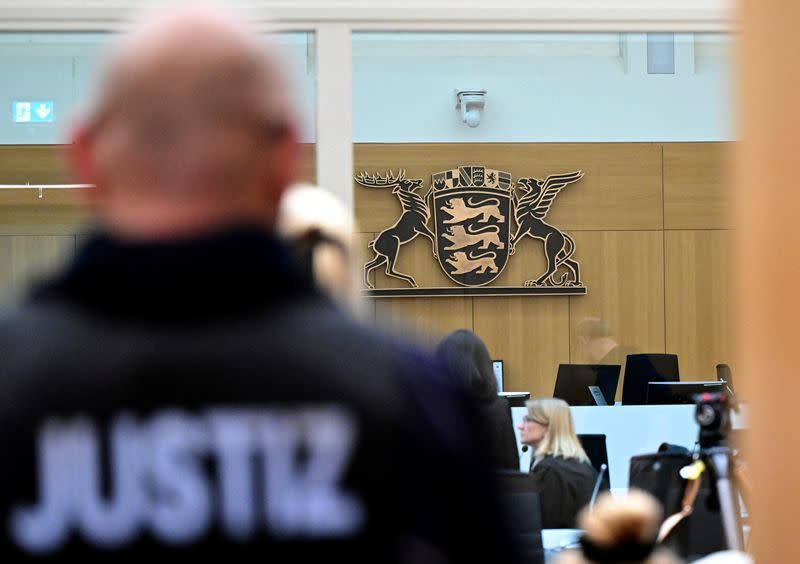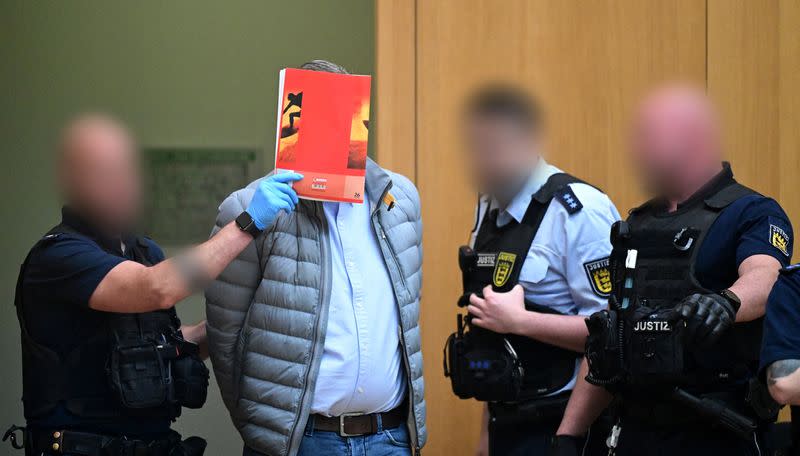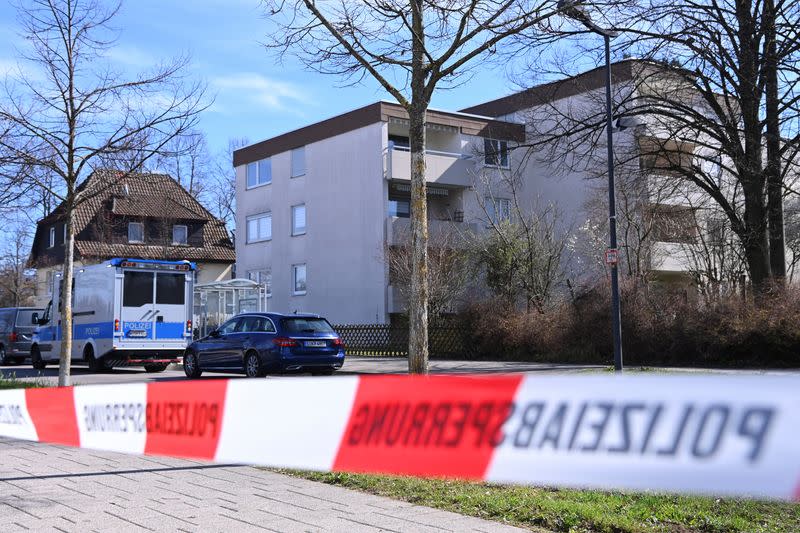German coup suspect targeted for his pandemic beliefs, lawyer says
By Thomas Escritt
STUTTGART, Germany (Reuters) -The lead suspect in the case against nine men accused of plotting a violent coup against the German state was targeted by prosecutors for his role in organising demonstrations against pandemic-era restrictions, his lawyer told a court on Monday.
The defendant, Marco van H., was a victim of the assumption that anybody who disagreed with COVID-19 social distancing measures was a dangerous extremist, his lawyer argued.
"This is against the people who organised demonstrations about the pandemic demonstrations," lawyer Viktoria Dannenmaier told the higher district court in Stuttgart. "Their fundamental rights were denied because they had a different opinion."
The hearing marks the start of three marathon trials of a total of 27 people - subscribers to the esoteric Reichsbuerger 'citizens of the Reich' belief system - who are accused of conspiring in a plot foiled by authorities at the end of 2022.
Filing into the maximum security courtroom in Stuttgart, the suspects, some in fleeces, some in shirts, looked glum in their handcuffs, exchanging greetings with their lawyers through grills set into the thick panes of glass separating them.
All nine suspects contest the charges against them.
The suspects in one of the largest criminal cases in German history had been held incommunicado until they met in the courtroom, being housed in detention centres all over southwest Germany.
Prosecutors accuse them of seeking to overthrow the German state and to install an aristocrat as Germany's ruler. They say the nine were part of a plot to storm the German parliament and detain legislators.
Their alleged role was to arrange local military cells that would crack down on any resistance to the coup.
Prosecutors said their willingness to use violence was shown by the way one of their number, gun enthusiast Markus L., unleashed a hail of bullets on policemen arriving to arrest him, causing one of them life-altering injuries.
But Dannenmaier said Marco van H. was not a dangerous man.
"L. is accused of attempted murder, but neither my client nor any of the others have done anything like that: it's all about showing that my client is also dangerous," she said.
Prosecutors said the plotters believed modern Germany to be ruled by a shadowy 'Deep State' which, among many crimes, detained and tortured children.
"They were convinced that the German population would back them once they knew what was going on," prosecutor Michael Klemm told the court. "They were aware that their plans would involve violence."
'HATRED FOR OUR DEMOCRACY'
Another 18 suspects await trial: aristocratic ringleader Heinrich XIII Prinz Reuss, scion of a now throneless dynasty who was to head the new government and eight other political leaders face trial in Frankfurt next month. The remainder go on trial in Munich in June. All contest the charges.
"These militant Reichsbuerger are driven by hatred for our democracy," interior minister Nancy Faeser said on Sunday. "We will continue our crackdown until these militant structures have been fully exposed and crushed."
Faeser has said right-wing extremism was the greatest radical threat to German democracy as mainstream politicians struggle to respond to a surge in the popularity of the far-right Alternative for Germany (AfD), second in polls.
Germany's domestic intelligence service (Verfassungsschutz) put members of the Reichsbuerger movement under observation in 2016. It says the group encompasses some 21,000 people and does not recognise modern-day Germany as a legitimate state.
The nine had stored up 500,000 euros in cash alongside 380 guns, 350 bladed weapons and some 148,000 rounds of ammunition, it said.
The Reichsbuerger have parallels to, and are partially inspired, by groups such as the QAnon movement in the U.S., where conspiratorial theories about a Deep State helped fuel the Jan. 6, 2021 storming of the Capitol in Washington D.C.
Judges have scheduled hearings in the Stuttgart case until January 2025, but given the complexity of the case and the number of witnesses and suspects, experts believe it could run for much longer, possibly even for several years.
(Reporting by Thomas Escritt; Editing by Friederike Heine, Gareth Jones and Ros Russell)

 Yahoo News
Yahoo News 